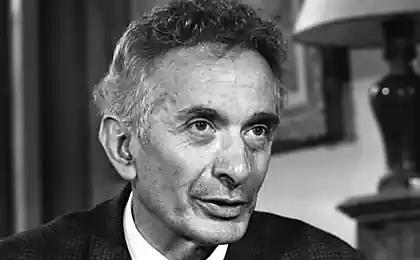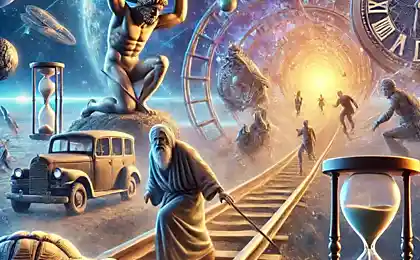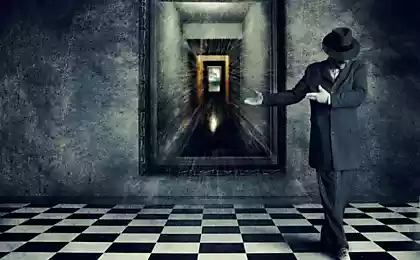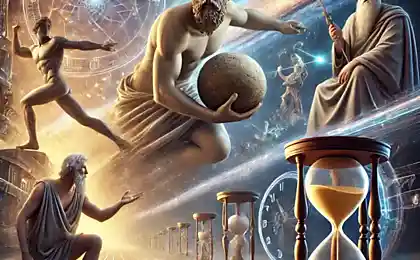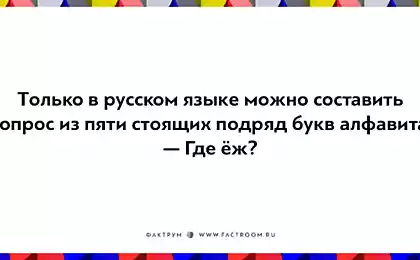1955
12 incredible paradoxes

Paradoxes existed since the times of the ancient Greeks. With logic you can quickly find a fatal flaw in the paradox, which shows why the seemingly impossible, possible, or that the paradox simply built on the shortcomings of thinking.
But you can understand the lack of each of the following paradoxes?
12. The paradox of Olbers
In astrophysics and physical cosmology Olbers paradox - this argument, saying that the darkness of the night sky conflicts with the assumption of an infinite and eternal static universe. This is one of the evidences of non-static universe, such as the current model of the Big Bang. This argument is often referred to as the "dark night sky paradox", which states that from any angle with the ground line of sight over, reaching the stars.
To understand this, we compare the paradox of finding a man in the woods among the trees white. If at any point of the line of sight ends up on the tops of trees, people did continue to see only white? This is contrary to the darkness of the night sky and makes many people wonder why we do not see only the light from the stars in the night sky.
11. The paradox of omnipotence
The paradox lies in the fact that if the creature can perform any action it may limit its ability to perform them, therefore, it can not perform all actions, but, on the other hand, if it can not limit his actions, it is that -So that it can not do.
This seems to imply that the ability of an omnipotent being to limit itself necessarily mean that it really limits itself. This paradox is often formulated in the terminology of the Abrahamic religions, although it is not a requirement.
One version of the omnipotence paradox is the so-called paradox of the stone: can the omnipotent being create a rock so heavy that even that would not be able to pick it up? If so, it ceases to be an all-powerful being, and if not, the creature was not all-powerful from the start.
The answer to the paradox is this: the presence of weakness, such as the inability to lift the heavy stone does not fall under the category of omnipotence, although the definition of omnipotence implies the absence of weaknesses.
10. The paradox Zorita
The paradox is this: look at a pile of sand, which is gradually removed from the sand grains. One can construct arguments using assertion:
- 1000000 grains - a pile of sand
- A pile of sand minus one grain of sand - it's still a pile of sand.
If continue without stopping the second action, eventually, it will lead to the fact that the pile consists of a grit. At first glance, there are several ways to avoid this conclusion. One could argue the first premise, saying that a million grains of sand - it's not a bunch. But instead of 1000000 can be arbitrarily large number of others, and the second statement is true for any number with any number of zeros.
So the answer is to just deny the existence of such things as a heap. In addition, one could argue the second premise, stating that it is not true for all "collections of grain," and that the removal of a single grain or grains of sand still leaves a bunch of a bunch. Or it may declare that a pile of sand can consist of a single grain of sand.
9. The paradox of interesting numbers
Adoption: no such thing as an uninteresting natural number.
Proof by contradiction: suppose you have a non-empty set of natural numbers, which are not interesting. Due to the properties of natural numbers, the list of numbers uninteresting necessarily be the smallest number.
Being the smallest number of sets, it could be defined as an interesting uninteresting in this set of numbers. But since the beginning of all sets have been identified as uninteresting, we have a contradiction, since the smallest number can not be both interesting and uninteresting. Therefore, the set of uninteresting numbers must be empty, proving that there is no such thing as an uninteresting number.
8. The paradox of the flying arrow
This paradox suggests that in order to occur the movement, the object must change the position it occupies. The example is the movement of the boom. At any time, the flying boom remains stationary because it is at rest, and as it is at rest at all times, so it is always fixed.
That is the paradox, Zeno pushed back in the 6th century, says the lack of movement as such, based on the fact that the moving body has to reach half before completing the movement. But since it is in each moment stationary, it can not reach the half. This paradox is also known as the paradox of Fletcher.
It is worth noting that if the previous paradoxes talked about space, paradox - on the division of time is not segmented, and at the point.
7. The paradox of Achilles and the tortoise
This paradox of Achilles runs over a turtle, after giving her a head start in the 30 meters. Assuming that each of the runners started to run at a certain constant speed (one very fast, the second very slow), then after a while Achilles, ran 30 meters to reach the point from which the tortoise has moved. During this time the turtle "run through" much less, say, 1 meter.
Then, Achilles will need some more time to overcome the distance over which the tortoise will advance farther. Having reached the third point, which visited the tortoise, Achilles will move on, but I still did not catch up to her. Thus, whenever Achilles will reach the tortoise, it will still be ahead.
Thus, since there are an infinite number of points, which should reach the Achilles and the tortoise which has already visited, he could never overtake the tortoise. Of course, logic tells us that Achilles can overtake the tortoise, because it is a paradox.
The problem with this paradox lies in the fact that the physical reality is impossible to endlessly traverse the point - as you can get from one point to another indefinitely without crossing the infinity of points? You can not, that is, it is impossible.
But math is not. This paradox shows us how mathematics can prove something, but in reality it is not working. Thus, the problem of the paradox that comes the application of mathematical rules for non-mathematical situations, and makes it inoperative.
6. The paradox of Buridan's ass
This is a figurative description of human indecision. This refers to the paradoxical situation where the donkey, while the two absolutely identical in size and quality of haystacks, will starve to death, as well as be able to make a rational decision and start eating.
The paradox is named after the 14th century French philosopher Jean Buridan (Jean Buridan), however, he was not the author of the paradox. It has been known since the days of Aristotle, who in one of his works tells the story of a man who was hungry and thirsty, but because both feelings were equally strong, but the man was between food and drink, it was not able to make a choice.
Buridan, in turn, never talked about this issue, but it raises the question of moral determinism, which meant that people, faced with the choice, of course, have to choose in the direction of greater good, but Buridan admitted the possibility of slowing down the choice to assess all possible advantages. Later, other authors treated with satire this point of view, referring to the donkey, who faced with two identical stacks of hay, will starve, taking a decision.
5. The unexpected hanging paradox
Judge says convicted, he would be hanged at noon in one of the working days of next week, but the day of the execution will be concluded for a surprise. He will not know the exact date until the executioner in the afternoon did not come to him in the chamber. After a little speculate, the offender comes to the conclusion that he would be able to avoid the penalty.
His argument can be divided into several parts. He begins with the fact that it can not hang on Friday, as if he was not hanged on Thursday, then Friday will not be a surprise. Thus, he ruled Friday. But then, since Friday is already removed from the list, he came to the conclusion that he can not be hanged on Thursday, because if he was not hanged on Wednesday, then Thursday also will not be a surprise.
Arguing similarly, it has consistently ruled out all the remaining days of the week. Joyous he goes to sleep with the assurance that the penalty will not happen at all. Next week, in the afternoon of the medium to his cell came the executioner, so, in spite of all his arguments, he was very surprised. All that said, the judge, was fulfilled.
4. The paradox of the barber
Suppose that there is a city with one male hairdresser, and that every man in the city to shave nalyso, some alone, some with the help of a barber. It seems reasonable to assume that the process is subject to the following rule: the barber shaves all and only those men who do not shave himself.
Under this scenario, we can ask the following question: barber shave himself? However, it is asking, we know that the answer can not be correctly:
- If the barber does not shave himself, he must abide by the rules and shave himself;
- If he shaves himself, then by the same rules he should not shave himself.
3. The paradox of Epimenides
This paradox stems from a statement in which Epimenides, contrary to common belief Crete suggested that Zeus was immortal, as in the following poem:
They created a tomb for you, the supreme holy
Cretans, perpetual liars, evil beasts, slaves belly!
But you're not dead: you're alive and you will live always,
Because you live in us, and we exist.
However, he did not realize that calling all Cretans are liars, and he could not help himself called an impostor, even though he "meant" that all Cretans, besides him. Thus, according to him, and all the Cretans are liars in fact, he is also a liar, and if he is a liar, then all the Cretans tell the truth. So, if all the Cretans tell the truth, then he is also, and this is the basis of his verse that all Cretans are liars. Thus, the chain of reasoning back to the beginning.
2. The paradox Evatla
This is a very old problem in the logic flowing from ancient Greece. It is said that the famous sophist Protagoras took to his doctrine Evatla, while it is clearly understood that the student will be able to pay the teacher only after he won his first case in court.
Some experts say that Protagoras demanded money for education as soon as Evatl finished their studies, others say that Protagoras waited a while until it became apparent that the student is not making any effort to find customers, and still others sure that Evatl tried very hard, but yet did not find. In any case, Protagoras has decided to sue the Evatla, he returned to duty.
Protagoras argued that if he wins the case, he will be paid his money. If it won Evatl, the Protagoras still had to get the money in accordance with the original contract, because it would be the first winning case Evatla.
Evatl, however, it was the fact that if he wins, then by the court he did not have to pay Protagoras. If, on the other hand, Protagoras wins, Evatl loses his first case, and therefore does not have to pay anything. So who are the rights of men?
1. The paradox of force majeure
The paradox of force majeure is a classic paradox formulated as "what happens when an irresistible force meets an immovable object?" The paradox should be seen as a logical exercise, not as a postulate possible reality.
According to current scientific understanding, no power is completely irresistible, and there can be no immovable objects completely, as even a small force will cause a slight acceleration of the mass of any object. The stationary object must have infinite inertia, and, consequently, the infinite mass. Such an object would collapse under its own gravity. Force majeure require infinite energy, which does not exist in a finite universe.

